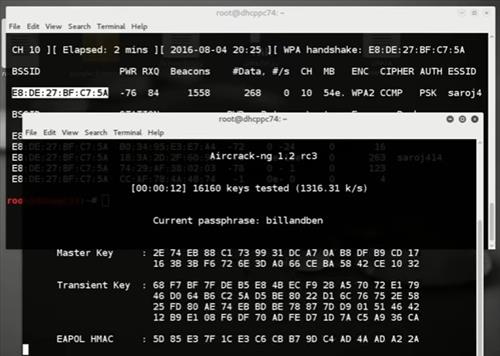
Nov 20, 2018 A wordlist or a password dictionary is a collection of passwords stored in plain text. It's basically a text file with a bunch of passwords in it. Most of the wordlists you can download online including the ones I share with you here are a collection of uncommon and common passwords that were once used (and probably still is) by real people.
Random Theory Thoughts: If it is an AP with a default ESSID odds are the password is still default and pretty much impossible to crack with a word list. If the AP has been named something then odds are that it has a dictionary attack capable password. The password could contain entropy. Meaning it could be PASSWORD but with padding like P.A.S.S.W.O.R.D.
The weakest Password just became strong and off your list. Something to think about. Some AP's have a secret (the same) PIN that is issued to every AP of that vendor. Hi I am trying this to open a protected.rar file with cRARK in Kali Linux.
My password length is 10 to 13. I am executing the command./crark -c -l10 -g13 /root/desktop.rar file.
And I partially remember the password. So I modified password.def file as ## abilnopr * ABINLNOPR * 1257 * 1257 abilnopr * 1257 ABILNOPR * abilnopr 1257 * ABILNOPR 1257 * ABILNOPR abilnopr 1257 $! * It taking more than a day to execute, But the password contains roop together, Is possible to mention somewhere and continue the search? Hi I am trying this to open a protected.rar file with cRARK in Kali Linux.
My password length is 10 to 13. I am executing the command./crark -c -l10 -g13 /root/desktop/file.rar file. And I partially remember the password. So I modified password.def file as ## abilnopr * ABINLNOPR * 1257 * 1257 abilnopr * 1257 ABILNOPR * abilnopr 1257 * ABILNOPR 1257 * ABILNOPR abilnopr 1257 $! * It taking more than a day to execute, But the password contains 'roop' together & '15', Is possible to mention somewhere and continue the search?

Bigger isn’t always better, but sometimes it is. If you need a huge word list before you hit those mask attacks, we’ve got you covered. We call it Rocktastic. When you absolutely, positively, got to crack every hash in the room; accept no substitutes.
Kniga jen kerner ona konchaet pervoj. We are former business owners, board members, consultants, project managers, analysts, and valued advisors to executives. We are focused and flexible partners and collaborators and have experience working across all functional and leadership levels.
People and passwords It’s 2016 and passwords are still a fundamental tenet of a systems security posture. An attacker’s ability to gain credentials is often a key factor to their success. We humans are basic creatures; creatures of habit and simplicity. For the uninitiated, password selection often follows a psychologically predictable format: familiar base words, upper case characters at the start and digits based on years at the end are all traits that we see often and get interested in.
A little too interested, sometimes enter Neil Lines (), a man who took things just a little bit too far. Today, we’d like to share some of his insanity with you.
A word list was born In December 2009, the social game developer RockYou was breached via a simple SQL injection attack. Far worse, all of their user’s 14 million passwords were stored in plain text format. The data hit the wider internet and the rest is history (including RockYou being fined – ouch). Attackers and security workers the world over have been using that word list ever since. In keeping with a poor security posture, RockYou didn’t enforce any password complexity, and so unsurprisingly most of the passwords were very basic. Therefore, many of the passwords – while interesting to study – were not particularly useful for cracking password hashes belonging to stronger systems. Introducing Rocktastic Neil Lines took the original RockYou word list and went to work.
At first, he just removed duplicates but before long, he was adding multiple passwords and permutations based on real world patterns. Over time, the word list grew.
He shared it with a select few individuals and improved the quality of the list, based on their feedback. We all noticed a significant improvement in the success rate of offline dictionary attacks versus other word lists. It’s fair to say that it became a bit of an obsession; a borderline madness. As with all madness, you can only keep it contained for so long. That’s why we’ve decided to cut a final version of this word list, which we’ve lovingly dubbed ‘‘. It’s a bit of a beast (which, as it goes, is the hostname of our GPU cracking rig but I digress). Word count That’s right.